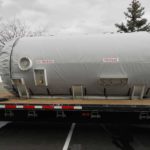What do most commercial and industrial buildings, gold mines, agricultural operations, petrochemical plants, and poultry processing plants have in common? They all require insulated storage tanks. Some need water tanks for fire prevention or processing. They can’t afford to have the water freeze. Other storage tanks for asphalt and diesel require a higher temperature to maintain proper viscosity and product integrity.
In this article, we’ll explore the advantages of industrial tank insulation and why it’s a wise investment for any business.
What is Industrial Tank Insulation?
Industrial tank insulation is a layer of material on the exterior walls of a tank to maintain a consistent temperature and reduce heat transfer.
Insulation for tanks can vary depending on the tank’s size, shape, and stored materials. Choosing the right insulation type for each tank ensures maximum effectiveness.
Why is the Storage Tank Insulated?
The reasons to insulate a storage tank are as varied as the contents they protect.
The primary purpose is to maintain a specific temperature range and to prevent freezing the tank’s contents. Insulation helps prevent heat loss or gain, which can be crucial in food, beverages, chemicals, or pharmaceuticals. Insulation can also help to prevent condensation, which can cause moisture damage to the tank or its contents.
How Does Industrial Tank Insulation Work?
Industrial tank insulation works by reducing the transfer of heat between the interior and exterior of the tank. The insulation creates a barrier that prevents heat escaping, keeping the temperature inside consistent.
Benefits of Industrial Tank Insulation
There are several benefits to insulating industrial tanks. Here are the 3 main benefits:
1. Improved Temperature Regulation
Insulation helps maintain a consistent internal temperature. Consistent fluid temperature control is critical for materials sensitive to temperature changes. A constant tank temperature ensures that the stored materials remain in optimal condition and reduces the risk of spoilage or other damage, e.g., prevents diesel fuel from “waxing” when temperatures fall.
2. Reduced Energy Costs
Insulation helps reduce the energy needed to maintain a consistent internal temperature. An uninsulated tank can increase energy bills as electric storage tank heaters or cooling systems work harder to maintain the set temperature. Insulated tanks provide significant cost savings over time.
3. Extended Tank Life
One area that is susceptible to corrosion is the tank base. A closed-cell foam industrial tank insulation helps protect the steel base structure of the tank against condensation, leading to expensive corrosion-related issues.
Custom Insulation Options for Industrial Tanks
You’ll find several insulation options for industrial tanks. The choice depends on the tank type, the stored contents, and the desired temperature range. Here are some of the custom insulation options available:
Fiberglass tank insulation – Lightweight, easy to install, fire-resistant, and has excellent thermal properties.
Mineral wool insulation – These natural or synthetic fibers work well for high-temperature applications and are water-resistant.
Foam insulation – Closed-cell foams can be sprayed or injected into hard-to-reach areas with service temperatures up to 180°F (82°C).
Reflective insulation – Reflects heat away from the tank like a mirror for tanks located in areas with high levels of sunlight.
The insulation choice depends on the tank type and contents, such as a home water heater.
What is Hot Water Tank Insulation?
Hot water tank insulation is a protective layer that prevents heat loss around a hot water tank. The insulation layer can be the same materials as industrial tanks, like fiberglass, foam, or cellulose.
If you invest in custom tank heating solutions, it makes sense to add insulation. It increases the life of the tank and the heater while reducing the cost of heating water.
Energy.gov says water heater insulation reduces heat loss by 25% to 45%. Energy cost savings are between 7% to 17%, which can pay for the insulation in about a year.
The Cost of Installing Industrial Tank Insulation
The cost variables to install industrial tank insulation depends on the size of the tank, the insulation type, local labor costs, and the complexity of the installation process. For an approximation, use $10 per sq. ft. for the material cost.
Reduced energy and maintenance savings over time should offset the initial installation cost. For example, a business that spends $10,000 on insulation may save $5,000 per year in energy costs. Additional savings include reduced maintenance and postponed tank replacement.
How To Select The Right Type of Tank Insulation
Some factors to consider when selecting insulation include:
- Temperature range
- Chemical resistance
- Fire resistance
- Moisture resistance
- Environmental impact
Working with a qualified insulation contractor is advisable to help you evaluate your needs.
Maintenance and Care Tips for Industrial Tank Insulation
Proper maintenance and care of industrial tank insulation ensure its longevity. Here are some tips:
-
- Regularly inspect the insulation for any signs of wear or damage.
- Remove any foreign objects that may have become lodged in the insulation.
- Repair any damage immediately to prevent water accumulation.
- Keep the insulation dry to avoid mold growth and other issues.
Note: Vertical insulation panels don’t require ongoing maintenance and are more resistant to moisture intrusion than horizontal tank insulation panels. Moisture entering horizontal insulation systems can buckle and compromise the entire storage tank insulation.
Common Challenges and Solutions for Industrial Tank Insulation
While insulation provides many benefits, it can also present some installation challenges. In cases where tanks are difficult to access, spray foam insulation may be a better choice.
For panel-type insulation, look for double-rolled seams to provide a weatherproof seal between panels to protect the tank from moisture.
Industrial Tank Insulation is a Smart Investment
Tank insulation can benefit companies that rely on tanks to stock or transport materials. Benefits include regulating temperature, reducing energy costs, and extending tank life.
No matter what your application, Powerblanket has custom tank heating blankets that can fulfill your needs. Explore Custom Tank Heated Blankets for smaller tanks such as IBC totes.
Frequently Asked Questions
What materials are used for industrial tank insulation?
Industrial tank insulation commonly uses materials like fiberglass, mineral wool, foam, and reflective insulation to maintain temperature and reduce energy costs.
Why is insulation important for storage tanks?
Insulation is crucial for storage tanks to maintain specific temperature ranges, prevent freezing, and reduce energy consumption, ensuring the integrity of the stored materials.
How does industrial tank insulation work?
Industrial tank insulation works by creating a barrier that reduces heat transfer between the tank's interior and exterior, maintaining a consistent internal temperature.
What are the benefits of insulating industrial tanks?
Insulating industrial tanks offers benefits such as improved temperature regulation, reduced energy costs, and extended tank life by preventing corrosion and condensation.
How do you choose the right type of insulation for a tank?
Choosing the right insulation involves considering factors like temperature range, chemical and moisture resistance, and environmental impact, often with the guidance of a qualified contractor.
No matter your application, Powerblanket has custom tank heating blankets that can fulfill your needs.







